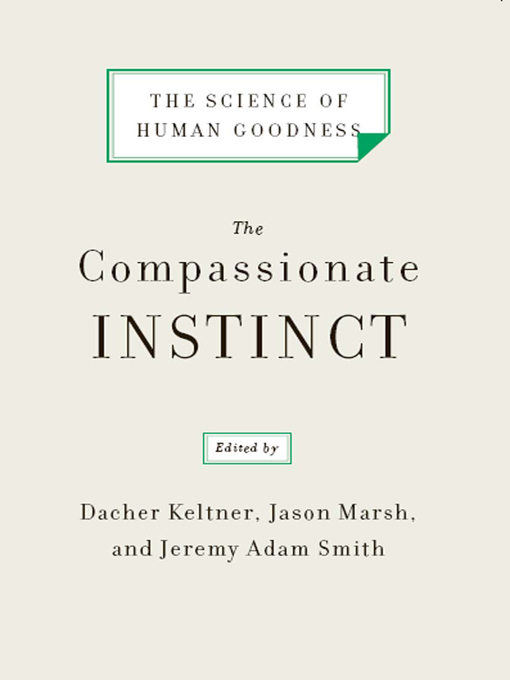
The Compassionate Instinct
The Science of Human Goodness
- اطلاعات
- نقد و بررسی
- دیدگاه کاربران
نقد و بررسی

October 15, 2009
Keltner (research director & cofounder, Greater Good Science Ctr., Univ. of California-Berkeley; "Born To Be Good") and editors of "Greater Good" magazine Jason Marsh and Jeremy Adam Smith compile 35 short articles from the publication, beginning with scientific roots, taking up interpersonal relationships, and ending with society and politics. The short, accessible essayswith no references or bibliographyunderscore empathy, forgiveness, gratitude, happiness, trust, and apology. Contributors include Jonathan Haidt, Alfie Kohn, Daniel Goleman, Meredith Maran, Steven Pinker, and Desmond Tutu. While encouraging, this collection is not Pollyannaish: experiments reveal the noxious effects of increased power, the ease with which people slip into bully and victim roles, and the difficulty of empathizing with strangers or with masses suffering as opposed to the grief of individuals. Dave Grossman's findings on soldiers' reluctance to kill, training methods used to bypass conscience, and the increase of post-traumatic stress disorder in veterans make a startling, important, optimistic statement about compassion. VERDICT A readable digest of current work in positive psychology for a general audience.E. James Lieberman, George Washington Univ. Sch. of Medicine, Washington, DC
Copyright 2009 Library Journal, LLC Used with permission.

December 1, 2009
Why would a Palestinian ambulance driver pledge to help a wounded Israeli soldier who had killed his brother? In contemplating the remarkable commitment of this ambulance driverand in dozens of other settingsthe contributors to this volume recognize an aspect of human nature that has long eluded scientific scrutiny. But in the 35 essays and interviews here collected (all originally published in Berkeleys Greater Good magazine), readers watch talented psychologists, neurologists, and primatologists investigate the riddles of human compassion. In the selections gathered in the first section, contributors probe the mysterious origins of human empathy, limning an evolutionary history that has primed the human brain for selflessness. In the second section, contributors explore ways to convert our biochemical potential for altruism into day-to-day behavior. Readers learn, for example, how wise management policies can promote caring collaboration even in the cubicle labyrinth. And in the final section, contributors outline strategiessuch as anti-bystander educationfor fostering ethical health in society as a whole. Though uneven, this collection stimulates serious reflection.(Reprinted with permission of Booklist, copyright 2009, American Library Association.)




دیدگاه کاربران